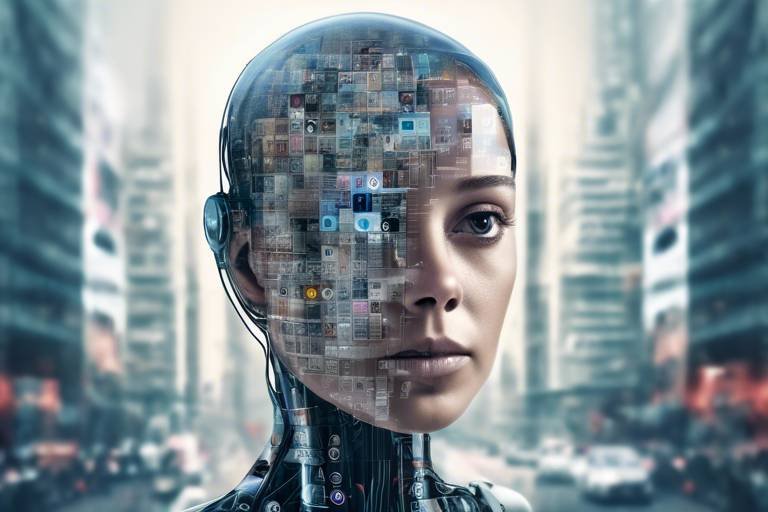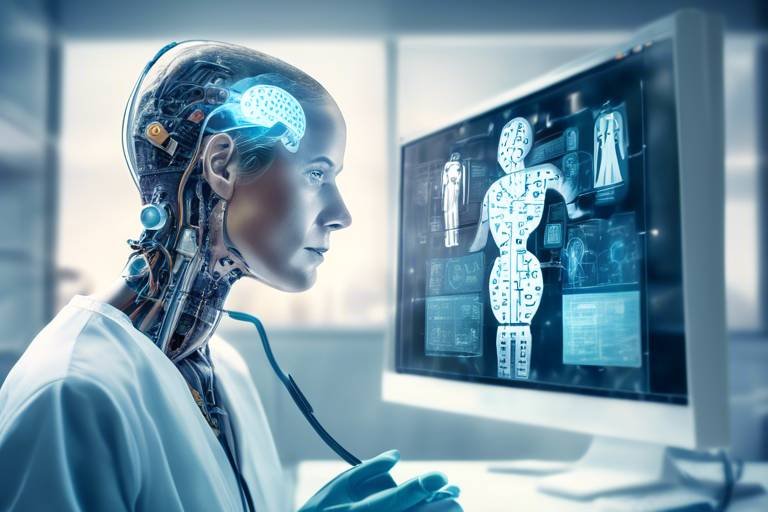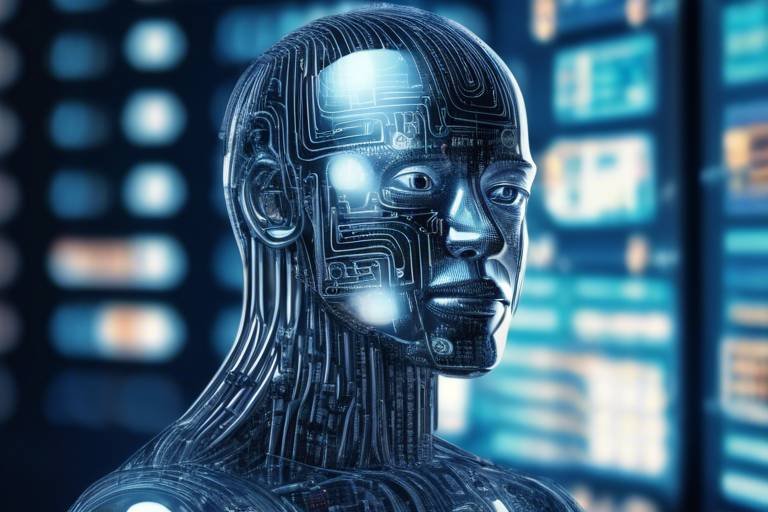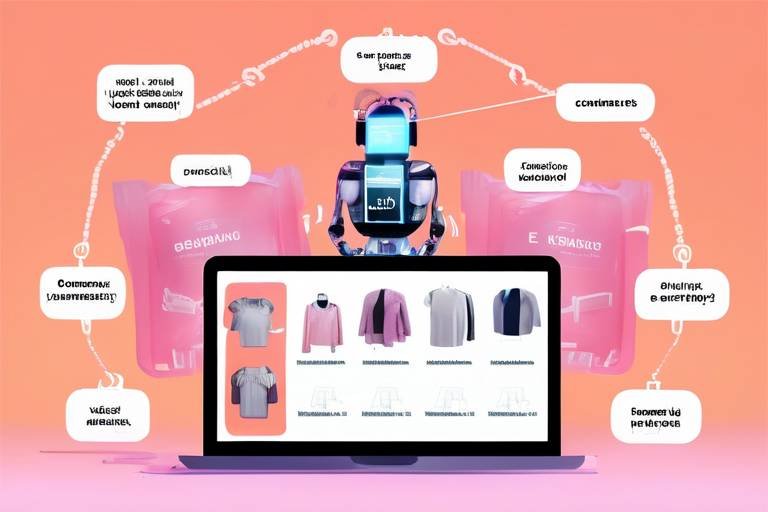Artificial Intelligence's Potential in Redefining Elderly Care
As we dive into the evolving world of technology, one of the most exciting areas is how artificial intelligence (AI) is reshaping elderly care. Imagine a world where seniors can enjoy their golden years with greater independence, enhanced health monitoring, and personalized care—all thanks to AI! This isn't just a futuristic dream; it's happening right now. With the integration of AI into various aspects of healthcare, we are witnessing a transformation that not only addresses the challenges faced by caregivers but also significantly enhances the quality of life for our elderly population.
In today's fast-paced society, the demand for effective elderly care solutions is more pressing than ever. With an aging population, caregivers often find themselves overwhelmed, juggling multiple responsibilities. Here is where AI steps in like a superhero, offering innovative solutions that streamline processes and improve outcomes. From health monitoring to communication and personalized care, AI is paving the way for a new era in elderly care.
Picture this: a senior living alone in their home, equipped with a smart device that monitors their health in real-time. If something goes amiss—like an irregular heartbeat or a fall—the system alerts caregivers or emergency services immediately. This is not just a fantasy; it's the reality that AI technologies are creating. By integrating AI-driven tools into elderly care, we can ensure that seniors receive the support they need, when they need it, without compromising their independence.
Moreover, AI's capabilities extend beyond mere monitoring. It can analyze vast amounts of data to create personalized care plans tailored to each individual's unique needs and preferences. This means that instead of a one-size-fits-all approach, seniors receive care that is as unique as they are. Imagine the peace of mind that comes from knowing that your health plan is designed specifically for you, taking into account your medical history, lifestyle, and even your personal preferences.
As we explore the potential of AI in elderly care, it's essential to recognize that this technology is not a replacement for human interaction. Instead, it complements the compassionate care that caregivers provide. By alleviating some of the burdens of routine tasks, AI allows caregivers to focus on what truly matters—building relationships and providing emotional support to seniors. In essence, AI is like a helpful assistant, giving caregivers more time to connect with those they care for.
In conclusion, the potential of artificial intelligence in redefining elderly care is immense. It offers innovative solutions that enhance health monitoring, improve communication, and create personalized care plans, ultimately leading to a better quality of life for seniors. As we continue to embrace these technological advancements, we can look forward to a future where elderly care is not only more efficient but also more compassionate.
- How does AI improve health monitoring for seniors? AI-powered devices can track vital signs and detect anomalies, allowing for timely intervention.
- Can AI replace human caregivers? No, AI is designed to assist human caregivers, not replace them. It helps streamline tasks and enhances care quality.
- What are the privacy concerns associated with AI in elderly care? Data privacy is crucial; robust security measures are needed to protect sensitive health information.
- Are seniors comfortable using AI technology? While some may face challenges, many AI solutions are designed to be user-friendly and accessible.

The Role of AI in Elderly Care
Artificial Intelligence (AI) is rapidly transforming the landscape of elderly care, and it's doing so in ways that many of us never thought possible. Imagine a world where seniors can live more independently, while caregivers have access to real-time data that helps them make informed decisions. This isn't just a dream; it's becoming a reality thanks to AI technologies. By integrating AI into elderly care, we are not only enhancing the quality of life for seniors but also addressing some of the critical challenges faced by caregivers and healthcare systems.
One of the most significant roles of AI in elderly care is its ability to improve health monitoring. Traditional methods of tracking health often involve manual checks and long waits for results, which can be cumbersome for both seniors and caregivers. However, with AI-driven health monitoring technologies, we can now leverage wearable devices and remote monitoring systems that provide continuous health tracking. This means that caregivers can respond swiftly to any changes in a senior's condition, potentially preventing emergencies and unnecessary hospitalizations. Imagine the peace of mind that comes from knowing that your loved one is being monitored 24/7 without the need for constant physical presence.
Moreover, AI enhances communication between seniors and their caregivers. Through AI-powered platforms, seniors can easily connect with healthcare professionals, family members, and friends. This connectivity is especially crucial for those who may feel isolated or lonely. The ability to have virtual consultations via telehealth services not only makes healthcare more accessible but also reduces the stress of traveling for in-person visits, which can be a significant hurdle for many elderly individuals.
But how does AI create personalized care plans? By analyzing individual health data, AI can tailor care plans that cater specifically to the needs and preferences of elderly patients. This means that instead of a one-size-fits-all approach, seniors receive care that is as unique as they are. A personalized care plan can include everything from medication management to dietary recommendations, ensuring that each senior receives the most effective and appropriate care possible.
In essence, the role of AI in elderly care is multifaceted, combining health monitoring, enhanced communication, and personalized care to create a comprehensive support system for seniors. As we continue to explore the potential of AI, we can only imagine the new heights we can reach in improving the lives of our elderly population.
- What types of AI technologies are used in elderly care? AI technologies such as wearable devices, remote monitoring systems, and telehealth platforms are commonly used to enhance elderly care.
- How does AI improve health monitoring for seniors? AI enables continuous tracking of health metrics, allowing caregivers to respond quickly to any changes in a senior's condition.
- Can AI help in creating personalized care plans? Yes, AI analyzes individual health data to create tailored care plans that meet the specific needs and preferences of elderly patients.
- What challenges does AI face in elderly care? Challenges include data privacy concerns, the need for caregiver training, and access to technology among seniors.

Benefits of AI-Driven Solutions
The integration of artificial intelligence (AI) into elderly care is not just a trend; it’s a revolution that promises to significantly enhance the quality of life for seniors. Imagine a world where our elderly loved ones can maintain their independence while receiving the best possible care. Sounds like a dream, right? Well, with AI-driven solutions, this dream is becoming a reality. These technologies are not only improving health assessments but also enabling timely interventions that can prevent serious health issues. This means fewer trips to the hospital and more time enjoying life.
One of the standout benefits of AI in elderly care is its ability to foster increased independence for seniors. With AI tools, elderly individuals can manage their health more effectively, leading to a greater sense of autonomy. For instance, AI-powered applications can remind seniors to take their medications, track their daily activities, and even alert caregivers if something seems amiss. This not only empowers seniors but also alleviates some of the burdens on caregivers who often feel overwhelmed by the responsibilities of monitoring multiple patients.
Furthermore, AI-driven solutions are designed to provide personalized care, which is crucial for addressing the unique needs of each individual. By analyzing vast amounts of health data, AI can help create tailor-made care plans that consider not just medical history but also personal preferences. For example, if a senior prefers to engage in light exercises in the morning, an AI system can recommend specific activities and track their progress. This level of personalization ensures that seniors receive care that truly resonates with them, enhancing their overall well-being.
Additionally, the accuracy of health assessments has significantly improved with AI technologies. Traditional methods of monitoring health can sometimes miss critical changes, but AI systems are designed to detect even the slightest variations in health metrics. This capability allows for timely interventions, which can be life-saving. For instance, if a senior's wearable device detects an irregular heartbeat, the AI system can instantly alert caregivers or medical professionals, ensuring that prompt action is taken.
To illustrate the benefits, consider the following table that summarizes key advantages of AI-driven solutions in elderly care:
| Benefit | Description |
|---|---|
| Increased Independence | Seniors can manage their health and daily activities with minimal assistance. |
| Personalized Care | Tailored care plans based on individual health data and preferences. |
| Improved Health Assessments | Accurate monitoring that allows for early detection of health issues. |
| Timely Interventions | Immediate alerts to caregivers and health professionals when needed. |
In summary, AI-driven solutions are reshaping the landscape of elderly care by providing tools that enhance independence, personalize care, and ensure timely health interventions. This not only leads to better health outcomes but also enriches the lives of seniors, allowing them to enjoy their golden years with dignity and joy. As technology continues to evolve, the potential for AI in this field is limitless, and the future looks bright for our elderly population.
- How does AI improve elderly care? AI enhances elderly care by providing personalized health monitoring, timely interventions, and increasing independence for seniors.
- What are some examples of AI technologies used in elderly care? Examples include wearable devices that monitor vital signs, AI-powered telehealth services, and applications that create personalized care plans.
- Are there any privacy concerns with AI in elderly care? Yes, data privacy is a significant concern, and it is essential to implement robust security measures to protect sensitive health information.
- How can caregivers be trained to use AI tools effectively? Caregivers should receive proper training to understand how to interpret AI data and integrate it into their caregiving practices.

Health Monitoring Technologies
In the realm of elderly care, are revolutionizing the way we approach the health and well-being of seniors. Imagine a world where caregivers can monitor the vital signs of elderly individuals from the comfort of their homes, receiving real-time updates that enable them to respond swiftly to any changes. This is not just a dream; it's a reality made possible by the integration of artificial intelligence into wearable devices and remote monitoring systems.
Wearable devices, such as smartwatches and health trackers, equipped with AI capabilities are designed to track a variety of health metrics. These include vital signs like heart rate and blood pressure, activity levels, and even sleep patterns. By collecting this data, caregivers gain valuable insights that help them make informed decisions regarding the health and safety of their elderly clients. For instance, if a wearable device detects an irregular heartbeat, caregivers can be alerted immediately, allowing for timely interventions that could prevent serious health issues.
Additionally, the advent of telehealth integration plays a significant role in enhancing health monitoring. AI-enhanced telehealth services allow seniors to have virtual consultations with healthcare providers, making healthcare more accessible. This is especially beneficial for those with mobility issues or those living in remote areas, as it reduces the need for in-person visits, which can often be challenging and exhausting. The combination of wearable technology and telehealth creates a seamless ecosystem where seniors can receive care without the barriers that traditional healthcare systems often impose.
To illustrate the impact of health monitoring technologies, consider the following table that highlights key features of various AI-powered wearable devices:
| Device | Key Features | Benefits |
|---|---|---|
| Smartwatch | Heart rate monitoring, activity tracking, fall detection | Real-time alerts, encourages physical activity, emergency response |
| Health Tracker | Sleep pattern analysis, step counting, calorie tracking | Improves sleep quality, promotes healthy lifestyle choices |
| Blood Pressure Monitor | Continuous blood pressure monitoring, data sharing with caregivers | Early detection of hypertension, proactive health management |
As we delve deeper into the future of elderly care, it's clear that these technologies are not just gadgets; they are lifelines that empower both seniors and their caregivers. By embracing health monitoring technologies, we are not only enhancing the quality of care but also fostering a sense of independence among elderly individuals. They can live their lives with greater confidence, knowing that their health is being monitored and that help is just a click away.
In conclusion, the integration of AI in health monitoring technologies offers a promising avenue for improving elderly care. By leveraging these innovations, we can create an environment where seniors feel secure and supported, ultimately enhancing their quality of life.
- What are health monitoring technologies? Health monitoring technologies refer to devices and systems that track and analyze health metrics, such as heart rate, activity levels, and sleep patterns, to provide insights for better care.
- How do wearable devices benefit elderly care? Wearable devices enable continuous health tracking, allowing caregivers to respond quickly to changes in seniors' conditions, which can prevent emergencies and hospitalizations.
- What role does telehealth play in elderly care? Telehealth facilitates virtual consultations, making healthcare more accessible for seniors and reducing the need for in-person visits, which can be challenging for those with mobility issues.
- Are there privacy concerns with health monitoring technologies? Yes, ensuring the privacy and security of sensitive health information is crucial, and robust measures must be in place to protect data from breaches and unauthorized access.

Wearable Devices
Wearable devices have emerged as a groundbreaking innovation in the realm of elderly care, acting as a bridge between technology and the well-being of seniors. Imagine a world where an elderly person's health can be monitored in real-time, where caregivers can receive instant alerts about potential health issues before they escalate into emergencies. This is not just a dream; it's the reality that wearable devices are creating. These gadgets, often resembling ordinary watches or fitness trackers, are equipped with sophisticated sensors and artificial intelligence capabilities that track vital signs, activity levels, and even sleep patterns.
For instance, a typical wearable device can monitor heart rate, blood pressure, and oxygen saturation levels, providing a comprehensive overview of an individual's health. Such continuous monitoring is crucial, especially for seniors who may have chronic conditions that require regular observation. With the data collected, caregivers can make informed decisions, adjusting care plans as necessary. Furthermore, these devices can alert caregivers or family members if any readings fall outside of normal ranges, allowing for swift intervention. In essence, wearable devices empower seniors to live more independently while ensuring that help is just a notification away.
Moreover, the integration of AI into these devices means that they can learn from the data they collect. For example, if a senior's activity levels drop significantly over a week, the device might flag this change as a potential concern, prompting caregivers to check in or adjust care strategies. This proactive approach not only enhances the safety of elderly individuals but also fosters a sense of autonomy, as they can engage in daily activities with the peace of mind that their health is being monitored.
However, while these technologies are promising, it is essential to ensure that they are user-friendly for seniors. Many devices come with features that simplify usage, such as large displays and voice commands. Caregivers also play a vital role in helping seniors understand how to use these devices effectively. The goal is to create an environment where technology complements care, rather than complicating it.
In summary, wearable devices represent a significant advancement in elderly care, combining convenience, safety, and independence. As technology continues to evolve, we can expect these devices to become even more sophisticated, further enhancing the quality of life for seniors. With the right implementation and support, wearable devices can truly revolutionize how we approach elderly care.
- What types of wearable devices are available for seniors? There are various types of wearable devices, including fitness trackers, smartwatches, and health monitors that specifically cater to seniors' needs.
- How do wearable devices help in emergency situations? Many wearable devices have built-in emergency alert features that can notify caregivers or emergency services if a senior falls or experiences a health crisis.
- Are wearable devices easy for seniors to use? Most modern wearable devices are designed with seniors in mind, featuring user-friendly interfaces and simplified controls.
- Can wearable devices track medication schedules? Some wearable devices can send reminders for medication, ensuring that seniors take their prescriptions on time.

Telehealth Integration
Telehealth integration represents a groundbreaking shift in how healthcare is delivered to the elderly. Imagine being able to consult with a healthcare provider without the hassle of traveling, especially for seniors who may have mobility issues. With the advent of AI-enhanced telehealth services, this dream is becoming a reality. These services not only provide convenience but also ensure that elderly patients receive timely medical attention, which is crucial for maintaining their health.
One of the most significant advantages of telehealth integration is the ability to conduct virtual consultations. This means that seniors can connect with their doctors from the comfort of their homes, reducing the stress associated with in-person visits. For many elderly individuals, the thought of navigating crowded waiting rooms or dealing with transportation can be daunting. Telehealth eliminates these barriers, allowing them to focus on what truly matters—their health.
Furthermore, AI plays a vital role in enhancing the telehealth experience. Through sophisticated algorithms, AI can analyze patient data in real-time, enabling healthcare providers to make informed decisions quickly. For instance, if a senior's health data indicates a potential issue, the AI system can alert the physician, prompting them to reach out for a consultation. This proactive approach not only improves health outcomes but also fosters a sense of security among seniors and their families.
Additionally, telehealth services can be tailored to meet the unique needs of elderly patients. For example, AI can help schedule appointments at times that are most convenient for the patient, or even send reminders to ensure they don't miss their consultations. This level of personalization is essential in elderly care, as it empowers patients to take charge of their health.
However, it’s important to recognize that while telehealth offers numerous benefits, it also presents challenges. For instance, not all seniors are tech-savvy, and some may struggle with the technology required for virtual consultations. This highlights the need for training and support for both seniors and their caregivers. By providing resources and education, we can bridge the digital divide and ensure that everyone has access to these essential services.
In summary, telehealth integration is revolutionizing elderly care by making healthcare more accessible and personalized. With AI at the forefront of this transformation, seniors can enjoy a higher quality of life, knowing that help is just a click away.
- What is telehealth? Telehealth refers to the use of digital information and communication technologies to access healthcare services remotely.
- How does AI enhance telehealth services? AI can analyze patient data, schedule appointments, and provide alerts for potential health issues, improving the overall efficiency of telehealth.
- Are telehealth services safe for seniors? Yes, telehealth services are designed with security measures to protect patient information and ensure privacy.
- What challenges do seniors face with telehealth? Some seniors may struggle with technology, highlighting the need for training and support to ensure they can effectively use telehealth services.

Personalized Care Plans
In the realm of elderly care, are becoming a game changer, thanks to the capabilities of artificial intelligence (AI). Imagine a world where each senior receives a care plan tailored specifically to their unique health needs, preferences, and lifestyle. This is not just a dream; it's becoming a reality. AI systems can analyze a plethora of data, from medical history to daily habits, creating a comprehensive profile that informs the care approach. This personalized touch not only enhances the effectiveness of care but also fosters a stronger bond between caregivers and seniors.
One of the most exciting aspects of AI-driven personalized care plans is their ability to adapt over time. Just as our needs change, so too can our care plans. For instance, if a senior starts experiencing new health issues or changes in their mobility, AI can quickly reassess the situation and suggest modifications to their care plan. This dynamic adaptability ensures that care remains relevant and effective, ultimately leading to better health outcomes and a more satisfying quality of life.
Moreover, personalized care plans can significantly boost the autonomy of elderly individuals. When seniors are involved in the decision-making process regarding their care, they often feel more empowered and engaged. AI can facilitate this by providing easy-to-understand insights and recommendations, allowing seniors to make informed choices about their health. For example, if an AI system identifies that a senior's medication regimen could be optimized, it can present this information in a straightforward manner, enabling the individual to discuss options with their healthcare provider confidently.
To illustrate the impact of personalized care plans, consider the following table that outlines the key components of a typical AI-driven personalized care plan:
| Component | Description |
|---|---|
| Health Assessment | Regular evaluations of medical history, vital signs, and lifestyle factors. |
| Customized Goals | Setting achievable health and wellness goals based on individual capabilities. |
| Monitoring and Feedback | Continuous tracking of health data with regular feedback to adjust care plans. |
| Caregiver Collaboration | Involving family members and caregivers in the planning and decision-making process. |
As we look ahead, the integration of AI in creating personalized care plans not only signifies a shift in how we approach elderly care but also emphasizes the importance of treating seniors as individuals with unique needs. This tailored approach can lead to improved adherence to treatment protocols, enhanced satisfaction with care received, and ultimately, a higher quality of life for our aging population.
- What is a personalized care plan? A personalized care plan is a customized approach to healthcare that considers an individual's unique health needs, preferences, and lifestyle.
- How does AI contribute to personalized care plans? AI analyzes various data points, including medical history and daily activities, to create and adjust care plans that are specific to each senior.
- Can personalized care plans change over time? Yes, they can be adapted based on changes in health status, preferences, or new medical information.
- What are the benefits of personalized care plans for seniors? They enhance care effectiveness, promote autonomy, and improve overall satisfaction with healthcare services.

Challenges in Implementing AI
As promising as artificial intelligence (AI) is for revolutionizing elderly care, it is not without its challenges. One of the most pressing issues is the data privacy and security of sensitive health information. With the integration of AI solutions, vast amounts of personal data are collected, stored, and analyzed. This raises concerns about how this data is protected from breaches and unauthorized access. For instance, a breach could expose sensitive information about an elderly person's health status, leading to potential misuse. Therefore, it is crucial to implement robust cybersecurity measures to safeguard this data.
Moreover, the need for caregiver training cannot be overstated. AI tools can be sophisticated, and without proper training, caregivers may struggle to interpret the data these tools provide. Imagine giving someone a high-tech gadget without showing them how to use it; the result is often frustration and underutilization. Caregivers need to be equipped not only with the knowledge to operate these tools but also with the skills to make informed decisions based on the data they receive. This requires ongoing education and training programs that can adapt to the rapidly evolving AI landscape.
Another significant hurdle is the digital divide affecting access to technology among seniors. While some elderly individuals may be tech-savvy, many still struggle with using modern devices and applications. This gap can lead to unequal access to AI-driven solutions. For instance, a senior who is not comfortable using a smartphone may miss out on telehealth services that could enhance their quality of life. Addressing this digital divide is essential for ensuring that all seniors can benefit from AI advancements.
In addition to these challenges, there is also the question of cost and funding. Implementing AI solutions can require significant financial investment, which may not be feasible for all healthcare facilities, especially smaller ones. This raises questions about how to allocate resources effectively while ensuring that the benefits of AI are accessible to a broader range of elderly care providers.
Lastly, there is the challenge of regulatory compliance. As AI technologies evolve, so too do the regulations governing their use. Keeping up with these changes can be daunting for caregivers and healthcare providers. They must navigate a complex landscape of laws and guidelines to ensure that they are compliant while also providing the best care possible. Failure to comply can lead to legal repercussions and undermine the trust that seniors and their families place in these technologies.
In summary, while AI holds incredible potential for enhancing elderly care, it is essential to address these challenges head-on. By focusing on data privacy, caregiver training, bridging the digital divide, managing costs, and ensuring regulatory compliance, we can pave the way for a future where AI significantly improves the lives of seniors.
- What are the main challenges of implementing AI in elderly care?
The main challenges include data privacy and security concerns, the need for caregiver training, the digital divide affecting access to technology, costs associated with implementation, and regulatory compliance.
- How can caregiver training be improved for using AI tools?
Caregiver training can be improved through ongoing education programs, hands-on workshops, and providing resources that help caregivers understand and utilize AI tools effectively.
- What steps can be taken to bridge the digital divide for seniors?
Steps include providing technology training sessions, simplifying user interfaces, and offering support services that help seniors become more comfortable with technology.
- Are there any regulations governing the use of AI in elderly care?
Yes, there are various regulations that govern the use of AI in healthcare, including privacy laws and guidelines that healthcare providers must follow to ensure compliance.

Data Privacy and Security
When it comes to integrating artificial intelligence (AI) into elderly care, one of the most pressing concerns is . With the vast amounts of sensitive health information being collected through AI technologies, it is paramount to ensure that this data is protected from breaches and unauthorized access. Imagine a scenario where a caregiver is monitoring a senior's health through a wearable device. This device collects vital signs, activity levels, and even sleep patterns. If this data falls into the wrong hands, it could lead to serious privacy violations, potentially endangering the senior's safety and well-being.
To mitigate these risks, healthcare providers must implement robust security measures. This involves not only using advanced encryption techniques but also establishing strict access controls. For instance, only authorized personnel should be able to access sensitive data, and even then, their access should be limited to the information necessary for their role. Such measures can help build trust among seniors and their families, ensuring that they feel safe using AI technologies.
Moreover, educating seniors about the importance of data privacy is essential. Many elderly individuals may not fully understand how their data is used or the potential risks involved. By providing clear information and resources, caregivers can empower seniors to make informed decisions regarding their health data. This education can include:
- Understanding what data is collected by AI devices.
- Learning how to manage privacy settings on their devices.
- Recognizing signs of potential data breaches.
Additionally, regulatory frameworks play a crucial role in ensuring the security of health data. Laws such as the Health Insurance Portability and Accountability Act (HIPAA) in the United States set stringent guidelines on how health information should be handled. Healthcare organizations must comply with these regulations to avoid hefty penalties and, more importantly, to protect their patients' privacy.
In summary, while AI has the potential to revolutionize elderly care, it is vital to prioritize . By implementing effective security measures, educating seniors, and adhering to regulatory standards, we can create a safe environment where AI technologies can thrive, ultimately enhancing the quality of care for our elderly population.
- What are the main concerns regarding data privacy in AI for elderly care?
The main concerns include unauthorized access to sensitive health data, potential data breaches, and the lack of understanding among seniors about how their data is used. - How can caregivers ensure the security of health data?
Caregivers can ensure data security by implementing encryption, restricting access to authorized personnel, and regularly updating security protocols. - What role do regulations play in protecting health data?
Regulations like HIPAA set standards for how health information should be managed, ensuring that healthcare providers take necessary precautions to protect patient data.

Training Caregivers
As the integration of artificial intelligence (AI) into elderly care continues to grow, the importance of cannot be overstated. Caregivers are the backbone of elderly care, and equipping them with the right skills to utilize AI tools is essential for maximizing the benefits of these technologies. Imagine a world where caregivers can seamlessly interpret data from AI-powered devices, making informed decisions that directly impact the health and happiness of seniors. This vision can only be realized through comprehensive training programs that empower caregivers with the knowledge and confidence they need.
Training must encompass various aspects, including understanding how to operate AI tools, interpreting health data, and recognizing when to act based on the information provided. For instance, caregivers should learn how to:
- Use wearable devices to monitor vital signs effectively.
- Engage with telehealth platforms for virtual consultations.
- Analyze data trends to identify potential health risks.
Moreover, training should also address the emotional intelligence required to interact with elderly individuals, ensuring that caregivers can maintain a compassionate approach while utilizing technology. After all, technology should enhance the human connection rather than replace it. Caregivers need to understand that the data provided by AI is merely a tool to aid their decision-making, not a substitute for their judgment and personal touch.
Organizations can implement various training methods to ensure caregivers are well-prepared:
| Training Method | Description |
|---|---|
| Workshops | Interactive sessions focused on hands-on experience with AI tools. |
| Online Courses | Self-paced learning modules that cover AI fundamentals and applications in elderly care. |
| Mentorship Programs | Pairing experienced caregivers with those new to AI applications for personalized guidance. |
By investing in caregiver training, we not only enhance the quality of care provided to elderly individuals but also foster a sense of confidence and empowerment among caregivers. They become more adept at using AI solutions, which ultimately leads to improved health outcomes for seniors. In turn, this creates a more harmonious relationship between technology and caregiving, ensuring that elderly individuals receive the best possible support in their daily lives.
- What types of AI tools are commonly used in elderly care?
AI tools such as wearable health monitors, telehealth platforms, and medication management systems are commonly used to enhance elderly care. - How can caregivers be trained to use AI technologies effectively?
Caregivers can be trained through workshops, online courses, and mentorship programs that focus on both technical skills and emotional intelligence. - What are the benefits of AI in elderly care?
AI can improve health monitoring, enhance communication, and create personalized care plans, leading to better health outcomes and increased independence for seniors. - Are there any challenges in implementing AI in elderly care?
Yes, challenges include data privacy concerns, the need for caregiver training, and addressing the digital divide among seniors.

The Future of AI in Elderly Care
The future of AI in elderly care is not just a fleeting dream; it's a burgeoning reality that promises to reshape how we approach the health and well-being of our senior population. As technology continues to evolve at an astonishing pace, the integration of artificial intelligence into elderly care is set to bring about a revolution that enhances not only the quality of care but also the quality of life for seniors. Imagine a world where AI-driven solutions can predict health issues before they arise, enabling proactive interventions that could save lives and reduce hospital visits. This is the future we are heading towards, and it is thrilling!
One of the most exciting prospects is the development of smart home technologies that utilize AI to create safer living environments for seniors. These systems can monitor daily activities, detect anomalies, and alert caregivers or family members if something seems off. For instance, if an elderly individual forgets to take their medication or falls, the system can send an immediate alert, ensuring timely assistance. This not only fosters a sense of security for seniors but also provides peace of mind for their loved ones.
Moreover, the integration of AI into robotics is another frontier that holds immense promise. Imagine robots that can assist with daily tasks, remind seniors about appointments, or even provide companionship. These robots can be programmed to learn the preferences of the individuals they assist, making them more effective over time. This kind of personalized interaction can significantly reduce feelings of loneliness and isolation, which are common among the elderly.
Furthermore, as AI continues to advance, we can expect to see enhanced predictive analytics in elderly care. By analyzing vast amounts of health data, AI can identify trends and potential health risks specific to individual seniors. This capability allows for the creation of tailored health plans that cater to the unique needs of each individual, ensuring that they receive the most effective care possible. The ability to anticipate health issues before they escalate is a game-changer for both caregivers and seniors.
However, the journey towards fully integrating AI into elderly care is not without its challenges. As we look towards the future, it's essential to address concerns regarding data privacy and security. With the increasing use of technology comes the responsibility to protect sensitive health information. Ensuring that robust security measures are in place will be crucial in gaining the trust of seniors and their families.
In addition, we must consider the digital divide that exists among seniors. While some may embrace technology, others may struggle to adapt. Therefore, it will be vital to provide training and support to ensure that all elderly individuals can benefit from these advancements. This approach will not only empower seniors but also enhance the overall effectiveness of AI solutions in elderly care.
In conclusion, the future of AI in elderly care is bright and filled with potential. As we continue to innovate and integrate these technologies into our healthcare systems, we can look forward to a world where seniors enjoy a higher quality of life, greater independence, and improved health outcomes. The possibilities are endless, and it's an exciting time to be a part of this transformative journey.
- What is the role of AI in elderly care?
AI plays a crucial role in elderly care by providing innovative solutions for health monitoring, personalized care, and enhancing communication between seniors and caregivers.
- How can AI improve health monitoring for seniors?
AI can improve health monitoring through wearable devices and remote monitoring systems that track vital signs and activity levels, allowing for timely interventions.
- What are the challenges of implementing AI in elderly care?
Challenges include data privacy concerns, the need for caregiver training, and addressing the digital divide that affects access to technology among seniors.
- What does the future hold for AI in elderly care?
The future includes advancements in smart home technologies, robotics, and predictive analytics, all aimed at enhancing the quality of life for seniors.
Frequently Asked Questions
-
What are the main benefits of using AI in elderly care?
AI brings a multitude of benefits to elderly care, such as enhanced health monitoring, personalized care plans, and improved communication. These technologies help caregivers respond quickly to changes in health, ensuring timely interventions and fostering greater independence for seniors.
-
How do wearable devices contribute to elderly health monitoring?
Wearable devices equipped with AI track vital signs, activity levels, and sleep patterns. This continuous monitoring provides caregivers with real-time data, enabling them to make informed decisions and prevent potential health emergencies before they escalate.
-
Can AI assist with telehealth services for seniors?
Absolutely! AI enhances telehealth services by facilitating virtual consultations, making healthcare more accessible for elderly individuals. This reduces the need for in-person visits, which can be particularly challenging for those with mobility issues.
-
What challenges are associated with implementing AI in elderly care?
While AI has great potential, there are challenges such as data privacy concerns, the need for proper caregiver training, and the digital divide that affects many seniors' access to technology. Addressing these issues is crucial for successful implementation.
-
How is data privacy handled in AI-driven elderly care solutions?
Ensuring the privacy and security of sensitive health information is paramount. Robust measures, including encryption and strict access controls, are necessary to protect data from breaches and unauthorized access, fostering trust in AI systems.
-
What role does caregiver training play in the effectiveness of AI tools?
Proper training for caregivers is essential to maximize the benefits of AI tools. It equips them with the skills needed to interpret data accurately and make informed decisions, ultimately enhancing the quality of care provided to elderly individuals.
-
What does the future hold for AI in elderly care?
The future looks bright for AI in elderly care! With ongoing advancements in technology, we can expect even more sophisticated solutions that will further improve health outcomes and enhance the overall quality of life for seniors.



















